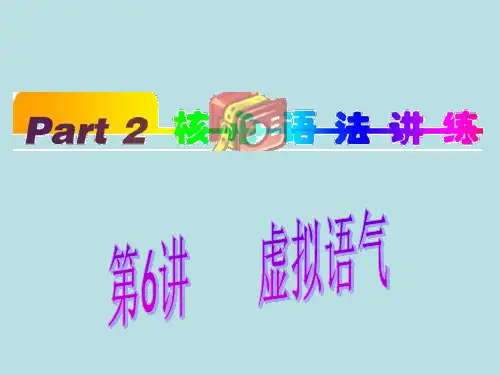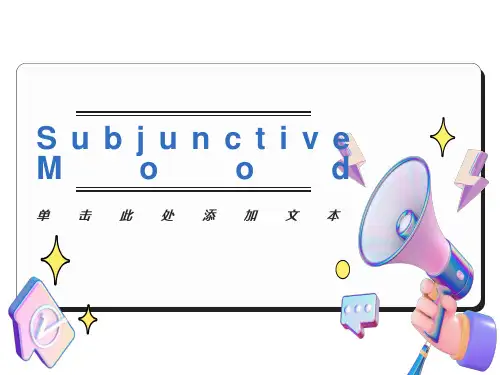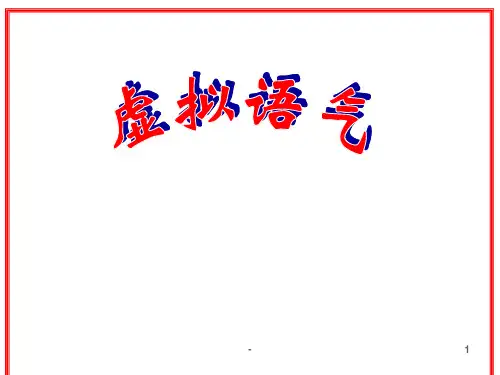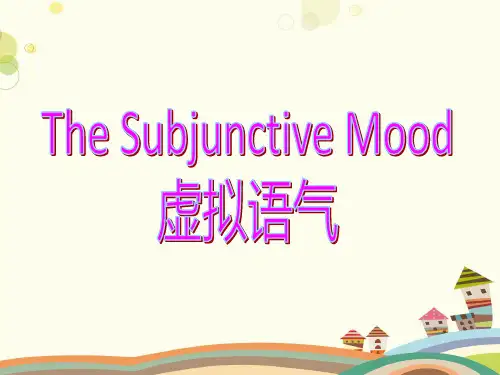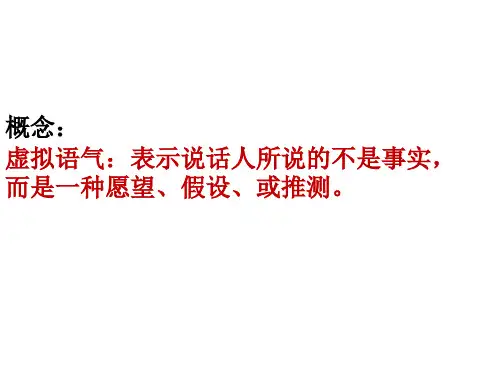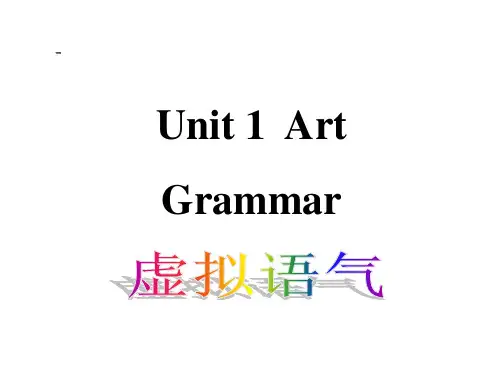- 1、下载文档前请自行甄别文档内容的完整性,平台不提供额外的编辑、内容补充、找答案等附加服务。
- 2、"仅部分预览"的文档,不可在线预览部分如存在完整性等问题,可反馈申请退款(可完整预览的文档不适用该条件!)。
- 3、如文档侵犯您的权益,请联系客服反馈,我们会尽快为您处理(人工客服工作时间:9:00-18:30)。
They insisted that the boy (should) go with them.
注意:suggest 当表示“暗示、表明“讲时,insist 表示”坚持认为“之意时,应用陈述语气。 The smile on his face suggested that he was satisfied with our work.
My idea is that we (should ) think it over before accepting it.
My suggestion that we (should) have a meeting has been accepted by others.
We all agree to that suggestion that the meeting (should) be put off.
Had you come a few….
4. without, but for,or和otherwise 构成虚拟。 but for要不是,or否则(含蓄条件句)
1.)Without sunlight, there would be no life
on our planet. 2.)But for your help, I wouldn’t have
the train.
3) I wish I were as clever as you
1)If I were a bird, I would fly in the sky.
2)If I had taken your advice ,I wouldn’t have made the mistake.
一、非真实条件句(if等)中的虚拟语气 1.时态一致 2. 错综时间的虚拟句 3. if省略用倒
装句
4.含蓄条件句 5. If only 感叹 二、名词性从句的虚拟语气:
宾语从句、主语从句、表语从句、同位语从句
三、几种特殊的虚拟语气句式
wish、as if/though、would rather、It’s time … It’s necessary/strange/matural/inportant+that从
finished the work.
3.)I was ill that day .otherwise , I would have taken part in the sports meet.(副词)
4.)He telephoned to inform me of your
birthday , or I would have known nothing about it .(连词)
虚拟语气
虚拟语气在 在条件从句中
3、省略 if 的条件从句
当从句中有 were, had 或 should 时,可省略if , 而把它们放在句首。
• If I were to meet him tomorrow, I should ask him about it.
Were I to meet him tomorrow,…
这些动词后面的宾语从句要使用虚拟语气 用法。即从句中的动词 使用should + 动词原 形,或者将should省略。
虚拟语气在:在宾语从句中
注意:insist / suggest 各有两意思,要用不同的语气
insist
① 表“坚决要求”,虚拟, should + do; ②表“坚称,坚持说”,陈述语气,表事实。
PRACTICE 1: Fill in the blanks.
a. If they w__e_r_e (be) here, they _w__o_u_ld__ta_k__e (take) your advice.
b. If the world-war _b_u_r_s_t (burst) out again, what _w__o_u_ld__h_a_p_p_e_n_ (happen) to our people on earth?
主句
If+主语+动词的过去式 (动词be用were)
主语+should,would, might,could+动词 原形
与过去 相反的 假设
If+主语+had +过去分词
主语+should,
would, might, could +have done
与将来 相反的 假设
1、If+主语+动词过去式 2、If+主语+were to+ 动词原形 3、If+主语+should +动词原形
It’s suggested that the plan be carried out.
My demand is that she should come to see me once a week.
We are for the advice that the factory should be
closed down.
• 4)If it rained tomorrow, we would not go shopping.
1. If I had 5000yuan, I would buy a computer. (与现在事实相反)
2. If I were a bird, I would fly in the sky. (与现在事实相反)
主语+should, would might, could+动词
原形
小小顺口溜
虚拟语气并不难, 从句时态都提前, 主句would加在前,注意动词要还原。 (省略if要倒装) e.g.
1)If I were in your shoes, I would accept the terms. 2) If we had left earlier, we wouldn’t have missed
句
1)If I were a bird, I would fly in the sky.
2)If I had taken your advice ,I wouldn’t have made the mistake.
3)If I had been there, it wouldn’t have happened.
偷钱包).
我们建议Tom 去休息一下。 他坚决要求我到场。 国王命令囚犯明天要实施死刑。 他们要求我们派他们去那儿工作。
We suggested that Tom have a rest. He insisted that I (should )be present.
The king ordered that the prisoners be killed the next day.
他脸上的表情表明他对我们的工作很满意.
The man insisted that he had never stolen the money.
那个人坚持说他没有偷钱.
(2)用于表语从句和同位语从句
在suggestion / proposal / order / plan / advice / idea / request 等名词后的表语和同位语从句中要用 “should+动词原形” should可以省略.
二. 名词性从句的虚拟语气。 主要是表示命令、要求、建议的虚拟语气。 1.宾语从句。常见动词: 一个坚持:insist 两个命令:order, command 三个建议:advise, suggest, propose 五个要求:demand , require, request, desire ask
They requested that we (should) send them to work there.
以上动词相应的名词构成的名词性从句 包括主语从句,表语从句和同位语从句也 要使用虚拟语气。从句中的动词形式一样。
即:(should)+V.
order, advice, suggestion, proposal, demand, request, desire
suggest
①表“建议”,虚拟, should + do; ②表“表明、暗示” ,用陈述语气。
1. The teacher suggested that we _(_s_h_o_u__ld__)_p_r_a_c_tise
more after class. (我们课后多练习)
2. The look on her face suggested that she
3. If I had taken your advice, I wouldn’t have made a mistake.
4. If he had been there, it wouldn’t have
happened. (与过去事实相反)
与现在 事实相 反的假 设
一、虚拟语气在条件句中
虚拟条件句
1. If I were you, I would have taken his advice. (从句指现在, 主句指过去)。
2. If I had taken my raincoat with me this morning, I would not be wet now. (从句指过去,主句指现在)。
Subjunctive Mood
We met in this room .
陈述语气
Do come to the
If I were you , I would study hard .
虚拟语气
虚拟语气
虚拟语气的概念
• 虚拟语气是一种特殊的动词形式,一是用 来表示说话人所说的话不是一个事实,而 是一种假设、猜测、愿望等(在条件从句中 或让步状语从句中);一是表示说话人的愿 望、要求、命令、建议等 (在宾语从句、 主语从句、表语从句、同位语从句)。


